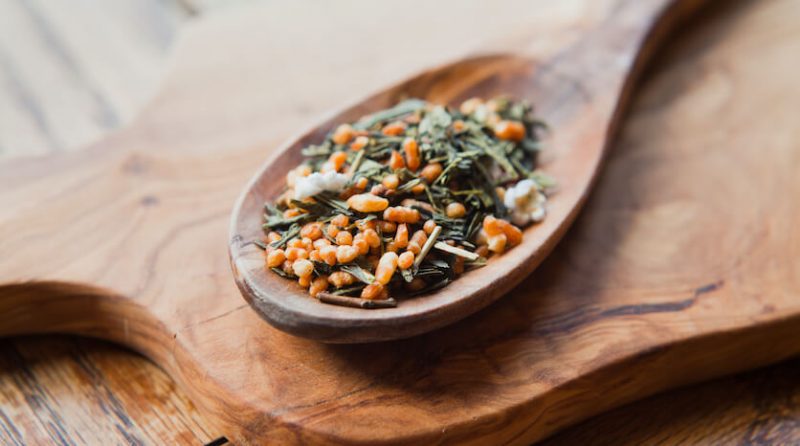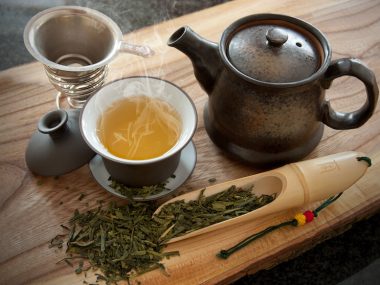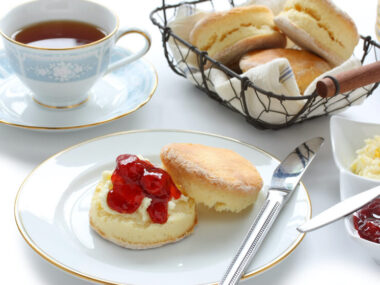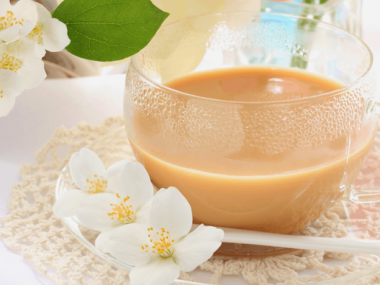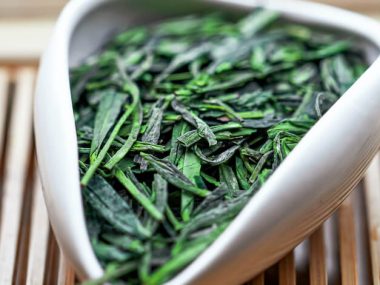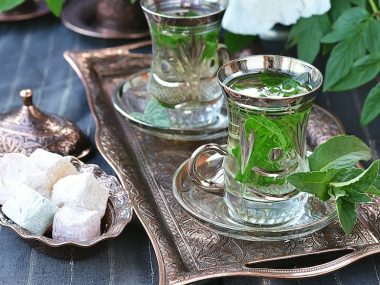If green tea isn’t your “thing,” we have one that can convert you into a die-hard fan. Close your eyes on that first sip, and you’ll swear someone snuck popcorn into your teacup. Yup, this is how Genmaicha tea tastes like!
Table of Contents
What Is Genmaicha Tea?
Genmaicha is a green tea made from the leaves of either bancha, sencha, or gyokuro tea leaves. After the tea is processed, roasted rice is added to the tea. It’s this rice that makes Genmaicha such a unique flavored drink.
Where Is Genmaicha Tea From?
This tea is a Japanese green tea. “Genmai” means brown rice in Japanese, and “cha” means tea. Add the two together, and you have “Genmaicha!”
Long ago, this tea got its humble beginnings from a lower grade tea known as bancha. Someone came up with an affordable tea for lower-class society who could not afford the more premium teas. Such an affordable tea would consist of a ratio of 50% low-grade green tea (bancha) and add a 50% filler (roasted brown rice).
So, we know that Genmaicha is made from sencha, bancha, or more expensive gyokuro green tea leaves.
The once added roasted brown rice is now replaced with roasted mochi rice because it is much more flavorful.
There’s still one more ingredient we haven’t mentioned, and that’s matcha. Tea producers began searching for a way to boost the color of Genmaicha — matcha was the solution. By adding a dusting of matcha to Genmaicha, the roasted rice tea became a much more vibrant green with an added layer of sweetness that complimented the tea.
The Japanese had finally married the classic flavor of rice with green tea to bring the best of two worlds together in a cup of tea!
What Does Genmaicha Taste Like?
A cup of this roasted rice tea has layers of flavors that deliver an unexpected taste. Most would expect green tea to have the grassy, vegetal flavor it’s known for. However, tea producers managed to pull something new out of their hats with a sweeter green tea such as Genmaicha.
The elements of green tea are present in this tea, and just as your palette recognizes those flavor elements, a savory flavor jumps in, surprising you with a nutty, corn-like taste (similar to popcorn). Genmaicha is smooth, sweet, and buttery-nutty.
What Does Genmaicha Pair Well With?
Genmaicha pairs lovely with cheesy dishes (macaroni and cheese, cheesy Brussel sprouts,) crackers and cheese, creamy chocolates, and sushi. Polenta is another food partner to pair Genmaicha with.
History Of Genmaicha
There’s no evidence-based historical background on Genmaicha tea. However, there’s a whole lot of storytelling, myths, and scuttlebutt about how this tea came to be.
One intriguing story we couldn’t pass up dates back to the 1400s. Around that time, Genmaicha tea came to be at one of Japan’s main islands, Honshu. A humble servant who went by the name of “Genamai” served tea to a group of gathered samurai soldiers. As Genamai bent down to place one of the teacups before a soldier, rice from Genamai’s pocket fell into the teacup.
The soldier became angry at the misfortune of grains in his cup of tea. He turned and proceeded to behead Genamai. As if nothing happened, the soldier sat down and drank his tea with rice in it. He liked it so much he named the tea after the beheaded servant.
This story has repeatedly made appearances online in tea blogs, but all lack evidence to back the story up. So, unfortunately, the true history behind Genmaicha tea continues to be a mystery.
How Much Caffeine Is In Genmaicha Tea?
Any true tea (black, green, yellow, oolong, white) can have up to 40 mg of caffeine in a six-ounce cup. However, the caffeine level in Genmaicha varies. Depending on what tea (sencha, bancha, gyokuro, matcha) the Genmaicha was made from, caffeine can be as much as 100 mg per six-ounce serving.
2 teaspoons of the following teas yield different amounts of caffeine.
- Gyokuro: 92 mg
- Sencha (1st flush:) 43 mg
- Bancha: 30 mg
- Matcha: 165 mg
For example, Genmaicha tea made with gyokuro and matcha added can have 92-100+ mg of caffeine. The dusting of matcha makes it difficult to know how much caffeine it contributes to Genmaicha. However, Genmaicha tea made with sencha will have 43 mg.
When Should I Drink Genmaicha?
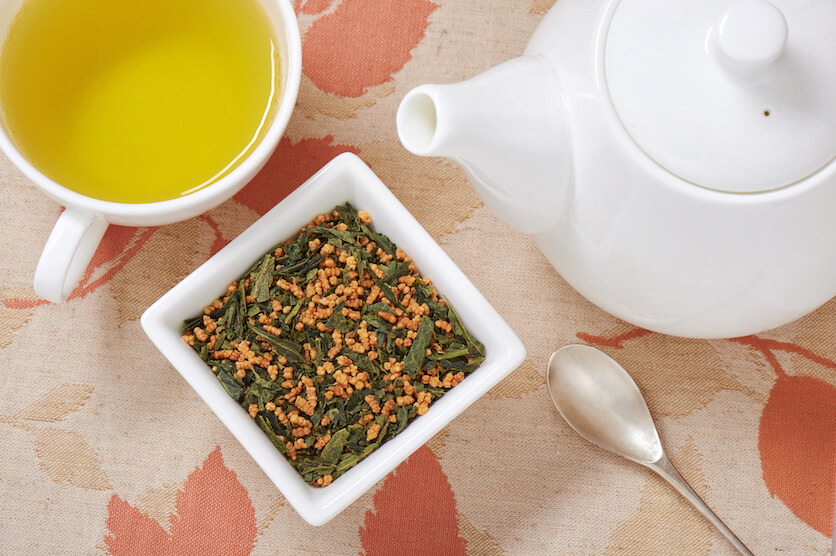
As a general rule of thumb, consuming caffeine after 3:00 pm can cause difficulty getting to sleep. So if a Genmaicha should happen to be made from gyokuro and have matcha added to brighten up the color and enhance the flavor, that Genmaicha is going to have a high amount of caffeine. This is not the ideal tea to enjoy late in the afternoon or the evening.
Does Genmaicha Expire?
Ideally, green tea should be stored properly to preserve both tea and flavor. Should you acquire green tea and leave it in the vacuum-packed container it comes in (unopened) stored in a dry/cool area such as a pantry/closet, it will stay good for much longer than you realize.
The Metropolitan Tea Company, Ltd. (a prominent tea trader based in Canada) published a product fact sheet on Genmaicha tea. Their fact sheet lists the shelf life of the tea if stored within certain parameters.
Unopened loose-leaf Genmaicha stored out of direct sunlight in an area where it’s cool and dry (unrefrigerated/unfrozen) has a shelf life of 20 years after the production date. Once opened, it will last for up to two years in a vacuum-pack container.
Genmaicha tea bags (traditional tea bag form) which are unopened, will also last up to 20 years after the date of production. If opened, those tea bags last for two years. Biodegradable pyramid tea bags have a shorter shelf life compared to traditional tea bags. Pyramid tea bags have a two-year shelf life regardless of whether they are opened or unopened.
According to the Journal of Sensory Studies’ research article (“Flavors of green tea change little during storage,”) stored green tea flavor changes very little for the first two years after the production date. A more comprehensive study (“Green Tea: Flavor Characteristics of a Wide Range of Teas Including Brewing, Processing, and Storage Variations and Consumer Acceptance of Teas in Three Countries”) notes that green tea changes very little during the first two years of storage (unopened.) Slight flavor degradation was detected at 12 months of storage.
Although tea doesn’t have an expiration date, your package may have a “best if used by” date. That date serves as a guideline to enjoy the tea at its peak freshness. However, tea can be stored for years unopened in the right environment.
Genmaicha Tea Benefits
Green tea is known to be beneficial because of the elevated levels of Vitamin C and constituents such as catechins, amino acids, phenols, and flavonoids.
The Curtin University of Technology published a research article (“Green Tea and Chronic Obstructive Pulmonary Disease: A Case-Control Study in Japan”), noting that people who regularly consumed green tea had a significantly reduced risk of stroke, cognitive impairment, cardiovascular disease, and more.
The Tea Association of the USA. reports that the consumption of green tea helps in weight loss, helps to optimize metabolism, and reduces the incidence of a heart attack. Flavonoids in green tea reduce lipid oxidation and help blood vessel function, both of which positively impact the cardiovascular system. Consuming tea also contributes to better dental health and helps build bone density that would otherwise lead to osteoporosis.
Both of the above-mentioned reports/studies note that tea drinkers who consume 1-3 cups of green tea daily greatly benefit.
Is Genmaicha Tea Good For You?
Because Genmaicha is a green tea, numerous evidence-based sources indicate the positive aspects of consuming green tea, as previously mentioned.
Those with any of the following should seek advice from a healthcare provider before consuming tea.
- Medical conditions
- Undergoing chemotherapy or radiation
- Taking medications
- Have sensitivities to caffeine
- Have allergies
Side Effects Of Genmaicha Tea
According to “Beneficial effects of green tea: A literature review,” green tea should not be consumed by pregnant/nursing women, those with heart conditions, those taking certain medications, those who are iron-deficient, and those with renal impairment. Green tea may cause adverse reactions that include abnormal heartbeat, diuretic effect, an accumulation of aluminum, and iron absorption.
How To Make Genmaicha Tea
Genmaicha tea can be brewed in several ways. Brewing and steeping time/temperature depends on whether your Genmaicha is made from sencha, bancha, or gyokuro.
Ingredients:
- 2 teaspoons of Genmaicha
- 2 cups of water
Directions
(for Genmaicha-sencha/gyokuro)
- Heat the water until it reaches 180 degrees (F.)
- Remove from the heat.
- Place the Genmaicha into a tea infuser.
- Drop the tea infuser into the hot water.
- Cover and allow to steep for 3 minutes.
- Remove the cover and tea infuser.
- Pour the tea into a cup and enjoy!
(for Genmaicha-bancha)
- Bring the water to a boil.
- Remove from the heat.
- Place the Genmaicha into a tea infuser.
- Drop the tea infuser into the hot water.
- Cover and allow to steep for 5 minutes.
- Remove the cover and tea infuser.
- Pour the tea into a cup and enjoy!
Genmaicha’s Gotcha
There’s no denying this green tea has a savory side to it. Many Genmaicha drinkers will tell you that once you’ve tried it, you’ll want more!
